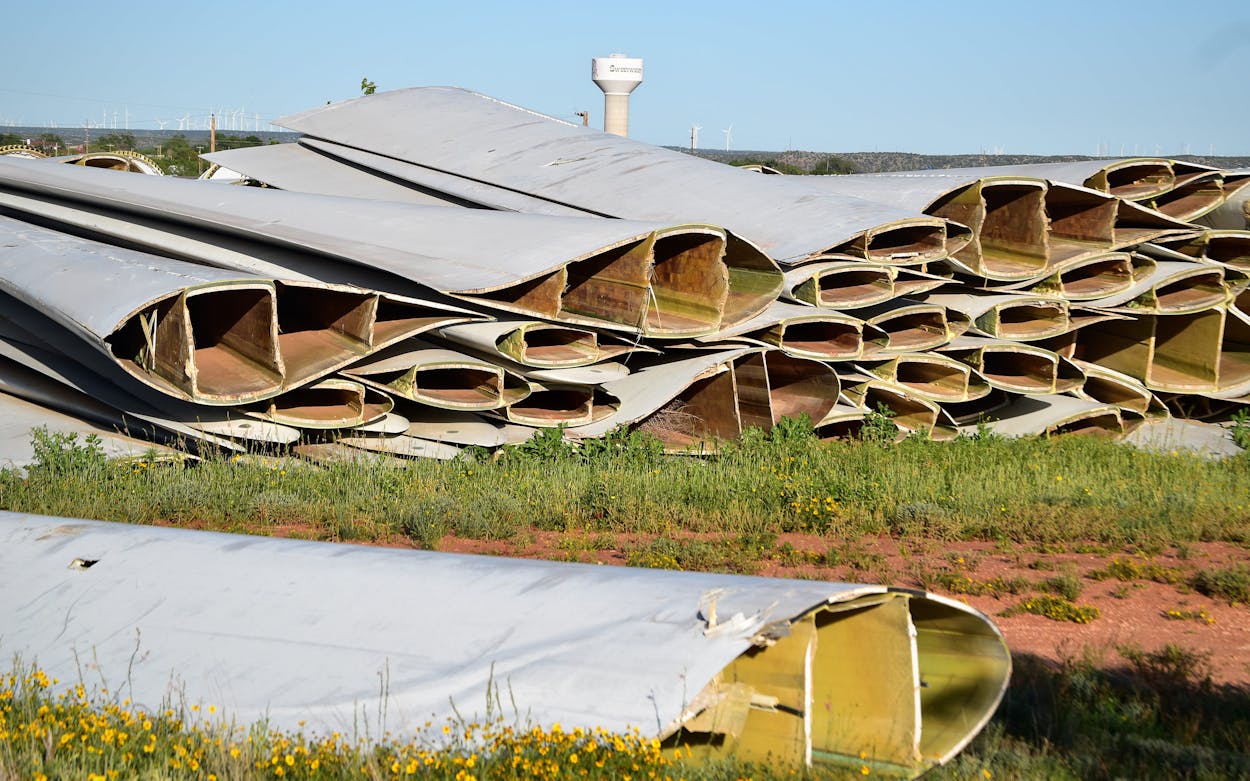The Sweetwater Cemetery welcomed its first permanent resident, an infant, in 1880. That was four years before the incorporation of the city, about forty miles west of Abilene, where the short-grass prairie that sweeps down from Canada peters out. Today the graveyard houses the final resting spots of many pioneers, immigrants, and Civil War veterans, according to a historical plaque on its gate.
Across the street sits another graveyard, of sorts. It opened in 2017 and has become a long-term home for thousands of discarded wind turbine blades. Each has been cut into thirds that remain as long as modest ranch houses. They are not buried in the earth but stacked haphazardly in rows of undulating off-white fiberglass.
This blade boneyard was built by Global Fiberglass Solutions, a Washington State company that promised the State of Texas, the county, the city, investors, wind-energy companies, and its Sweetwater neighbors that its business plan was to temporarily store the blades there before grinding them up and recycling them into pallets or railroad ties. That never happened, but after I first visited the site, last August, the company’s CEO, Don Lilly, promised: “If you come back nine months from now, you will not see the material.”
I returned last week to find nothing of the sort. Sweetwater officials have tired of the years of unkept promises and little help from state authorities to address the situation. The blades remain as they were, and nearly every local I spoke with said they hadn’t seen any recent activity in the yard. The exception was a young man wearing a baseball cap bearing the name of an oil-field service company. He was installing solar-powered spotlights for his mother’s gravestone when he told me he occasionally spies foxes and snakes moving among the blades when he visits the cemetery.
Global Fiberglass has an office around the corner, connected to an open-sided industrial warehouse. “Recycling in Progress,” reads a sign on a box truck parked behind a chain-link fence, but the evidence suggests that’s an empty promise. The front steps to the office teem with weeds and wildflowers, including an intensely yellow patch of brown-eyed Susans that have grown from a crack in the pavement. I knocked on the locked door for a couple of minutes and yelled a greeting through the fence. As I waited for a response that never came, I peered at the remains of a gutted camper at what the company had promised would be a facility humming with activity.
The blade boneyard occupies thirty acres in an industrial area near downtown Sweetwater that’s close to Interstate 20. A smaller satellite dump sits a couple miles south of town. When I told Samantha Morrow, the Nolan County attorney, that I had been unable to reach Lilly, she told me she couldn’t reach him either. “I am not aware of him having any contact with any other county representatives,” she said.
GFS may be out of the funds it would need to begin grinding up the blades. Last September, General Electric filed a lawsuit claiming it had paid GFS $16.9 million to recycle about five thousand blades, which the company instead stockpiled in Sweetwater and Iowa. GFS took the money and the blades and then “all but shut down,” according to the complaint. GFS has asked for an extension because it can’t hire a lawyer. “GFS has not been able to raise sufficient funds to convince counsel that they will get paid for their work,” company cofounder Ron Albrecht said in a court filing in January. General Electric expects to file for a default judgment later in May.
While there has been little to no progress in disposing of the blades in Sweetwater, a different outcome took shape in Iowa. That state’s environmental agency investigated, determined that GFS was running an unpermitted dump, and forwarded the matter to the state’s attorney general. A subsequent investigation determined that GFS never owned the blades.
This finding has paved the way for a Tennessee company called Carbon Rivers to begin the lengthy process of recycling about one thousand blades into material to make, among other items, composite decking boards, ceiling tiles, and injection-molded automobile cupholders.
“We can entirely and completely reuse a wind turbine blade,” said David Morgan, the chief strategy officer of Carbon Rivers. “You have glass fiber and carbon fiber composite and resin and other constituent parts like wood and foam. All that can be recovered.” When I asked him what he saw when he looked at photographs of the blades in Sweetwater, he said, “I see a new boat, a new car, a new blade. There is no longer any need whatsoever to landfill composites.”
There can’t be any new products fashioned from the material in Sweetwater until someone takes ownership of the problem that GFS has apparently abandoned. The State of Texas could take charge, but its wheels of justice are turning much slower than Iowa’s. In late 2022, the Texas Commission on Environmental Quality fined GFS $10,255 and gave it a year to obtain a permit to store industrial solid waste. That year lapsed in November, and the company never finished paying the fine.
A couple of weeks after TCEQ’s deadline, GFS filed for a solid-waste recycling permit. The effort appears slapdash. In response to a question on the application that asks how the material will be recycled, Lilly wrote that the blades will be cut into three-by-five-foot sections, then “these pieces will be fed into a shred,” the sentence abruptly ending there, without even a period.
The state rejected the permit, noting that the proposed activities were for storing and processing blades, not recycling. Nearly six months later, the matter has not been turned over to the Texas attorney general. “Global Fiberglass is in active communication with TCEQ on efforts underway to return to compliance,” an agency spokesman told Texas Monthly in an email. The matter remains in limbo.
Morrow, the Nolan County attorney, has given up on expecting TCEQ or the attorney general to ride to the rescue. “We have waited, and the state has not intervened to enforce their order,” she said. Nolan County and the City of Sweetwater have begun talks on a public-private collaboration to fix the mess, but they declined to say with whom, citing ongoing negotiations.
The solution will require legal and engineering expertise that Morrow’s office doesn’t have, but she said there is no other option. Otherwise, the Sweetwater dumps could long remain symbols of bureaucratic futility and lost opportunity.
- More About:
- Business
- Energy
- Wind Power








